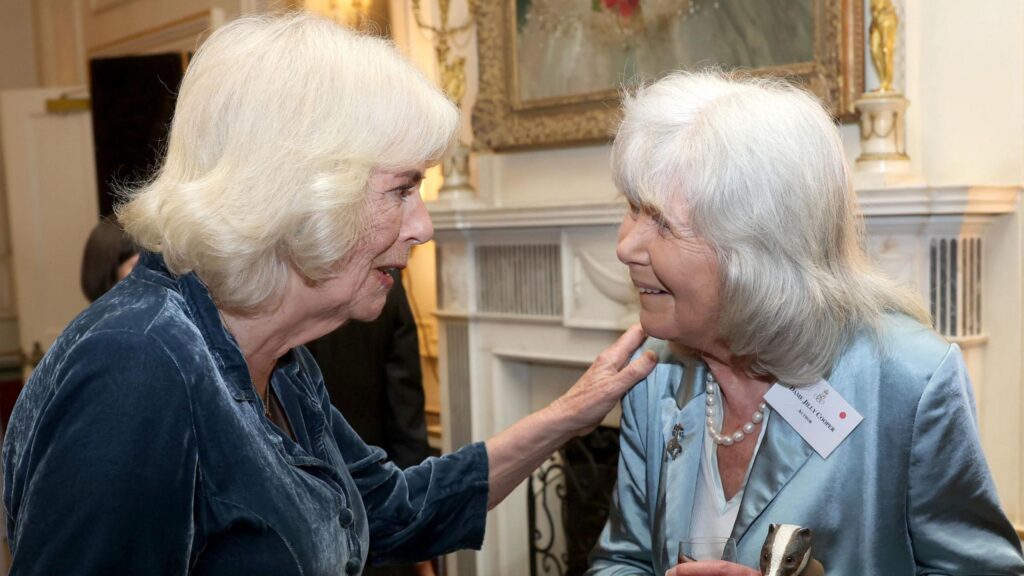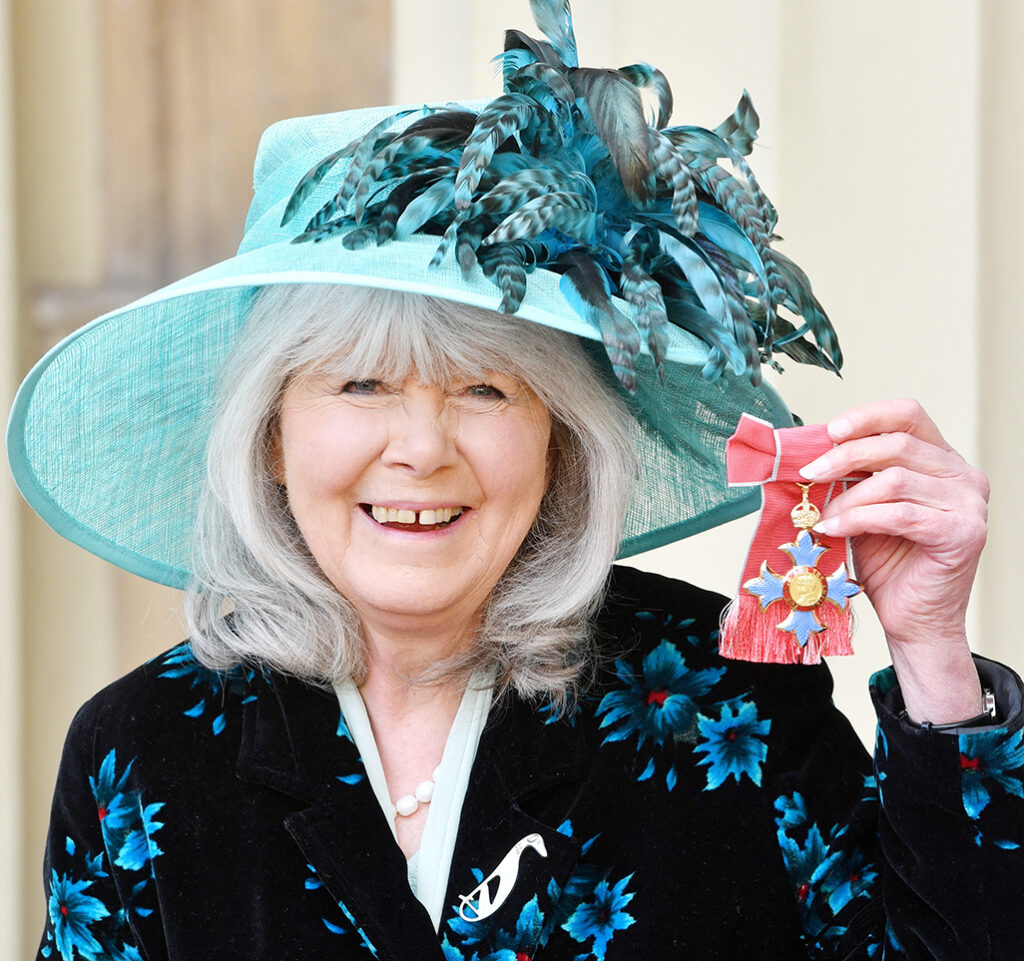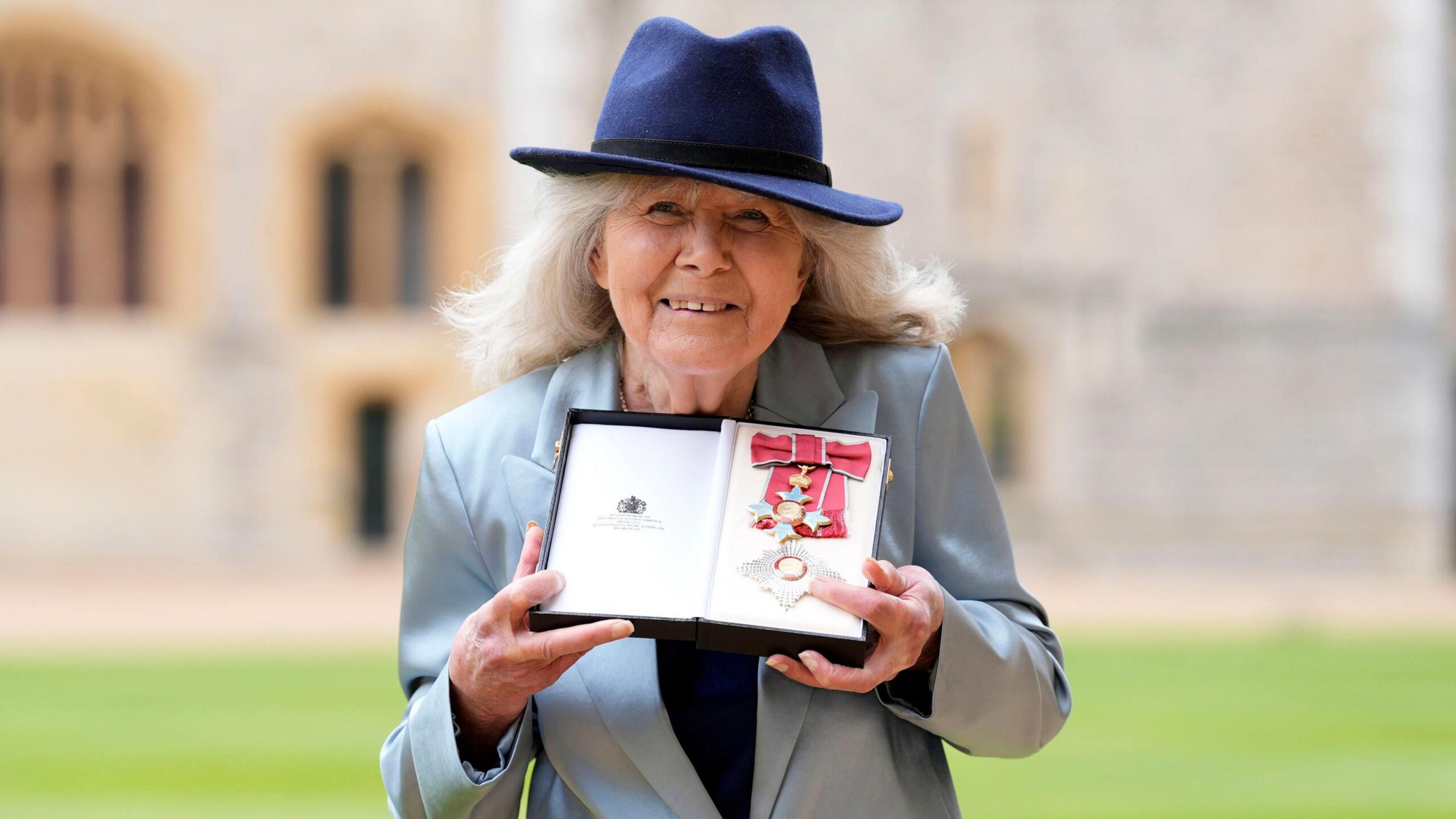A Literary Legend Passes: The Life and Legacy of Dame Jilly Cooper
On October 5, 2025, the literary world lost one of its most vibrant and enduring figures. Dame Jilly Cooper, the undisputed queen of the bonkbuster novel, died at the age of 88 following a tragic fall at her Grade II-listed home in the Cotswolds.
Her agent confirmed the news, noting that the author passed away early Sunday morning after being rushed to Gloucester Royal Hospital. The suddenness of her departure shocked her family and fans alike.
Her children, Felix and Emily, described her as “the shining light in all of our lives,” adding that her love for family and friends “knew no bounds.” Their statement reflected the complete shock of her unexpected passing and the profound impact she had on those closest to her.
Leading the outpouring of tributes was Queen Camilla, a long-standing friend of Cooper’s, who released a heartfelt statement through Buckingham Palace.

“I was so saddened to learn of Dame Jilly’s death last night,” the Queen wrote. “Very few writers get to be a legend in their own lifetime, but Jilly was one — creating a whole new genre of literature and making it her own through a career that spanned over five decades.”
The Queen added, “In person she was a wonderfully witty and compassionate friend to me and so many – and it was a particular pleasure to see her just a few weeks ago at my Queen’s Reading Room Festival, where she was, as ever, a star of the show.”
Camilla concluded her tribute with a characteristically playful wish: “May her hereafter be filled with impossibly handsome men and devoted dogs.” The message perfectly captured Cooper’s love for romance, animals, and irreverent humor.
This touching statement reflected a friendship rooted in shared passions for literature and dogs. Cooper and Camilla had known each other for decades, their bond strengthened by social circles in the Cotswolds and literary events such as the Queen’s Reading Room Festival at Chatsworth House in Derbyshire last month.
Cooper once revealed that she and Camilla often chatted about “how much we love each other,” living nearby and sharing a mutual admiration. Interestingly, she once admitted that her iconic lothario character, Rupert Campbell-Black, was partly inspired by Camilla’s ex-husband, Andrew Parker Bowles, blending real-life glamour with fictional mischief.
The Prime Minister’s spokesman also paid tribute, calling Cooper “a literary force whose wit, warmth, and wisdom shaped British culture for over half a century and brought joy to millions.”
Former Prime Minister Rishi Sunak, a self-confessed fan, praised her novels for their escapism and energy.
Celebrities, authors, and the cast of the recent Disney+ adaptation of Rivals also expressed their admiration. Actress Victoria Smurfit, who played Maud, called Cooper “a divine queen and human sunshine,” comparing her to “Paddington Bear with a naughty twinkle.” Actor Rufus Jones, who was filming season two of Rivals when news broke, said the cast felt “devastated” but privileged “to have entered Jilly’s world.”
Cooper’s agent, Felicity Blunt, reflected on her lasting relevance: “You wouldn’t expect books categorized as bonkbusters to have stood the test of time so well, but Jilly wrote with acuity and insight about class, sex, marriage, rivalry, grief, and fertility.”
Her publisher, Bill Scott-Kerr, called working with her “one of the great privileges and joys of my publishing life,” praising her kindness, humor, and deep affection for animals.
As tributes continue to pour in from around the world, it is clear that Dame Jilly Cooper’s influence extended far beyond the page. Her warmth, wit, and unapologetic zest for life will continue to inspire readers for generations to come.
Early Life: From Yorkshire Roots to Journalistic Ambitions
Dame Jilly Cooper, born Jill Sallitt on February 21, 1937, in Hornchurch, Essex, came from a family with deep Yorkshire ties—her parents, Mary Elaine (née Whincup) and Brigadier W.B. Sallitt, hailed from established Yorkshire lineages involved in newspaper publishing and politics. Growing up in Ilkley, Yorkshire, and later Surrey, young Jilly attended Moorfield School in Ilkley and Godolphin School in Salisbury, Wiltshire. Her early years were marked by a love for the countryside, animals, and storytelling, influences that would later permeate her work.
After leaving school, Cooper aspired to a career in national journalism but faced rejections. Undeterred, she landed a job as a junior reporter for The Middlesex Independent in Brentford at age 20, covering local events from fetes to football matches. This gritty start honed her observational skills and witty prose. She later ventured into public relations, humorously claiming on her website to have been sacked from 22 jobs before finding her footing in book publishing. These early setbacks built her resilience, turning her into the sharp social commentator she became.
In 1961, at 24, she married Leo Cooper, a publisher and her childhood sweetheart from Yorkshire. Their whirlwind romance—he proposed on their second date after unpinned her hair and declared it should never be up again—mirrored the passionate unions in her future novels. The couple faced heartbreak with an ectopic pregnancy, leading to their inability to have biological children. They adopted Felix and Emily, and later welcomed five grandchildren: Jago, Lysander, Acer, Scarlett, and Sienna. Leo’s death in 2013 from Parkinson’s disease left a void, but Cooper cared for him devotedly at their Cotswolds home, even writing to cover medical costs. Their marriage, spanning over five decades, inspired her non-fiction works on relationships.

The Rise to Literary Stardom: From Columns to Bestsellers
Cooper’s breakthrough came in 1968 when she met Godfrey Smith, editor of The Sunday Times Colour Magazine, at a dinner party. Her piece on being a hopelessly undomesticated young wife led to a column that ran for over 13 years, followed by five years at The Mail on Sunday. This platform showcased her irreverent humor, blending domestic anecdotes with sharp social observations.
Her first book, How to Stay Married (1969), drew from these columns, offering dated but entertaining advice like amusing a husband in bed to overlook household dust. It was a hit, launching her non-fiction career. Follow-ups included How to Survive from Nine to Five (1970), books on class (Class, 1979, an outrageously irreverent view of the British class system), animals (Intelligent and Loyal, later Mongrel Magic), and romance. In 1972, for the UK launch of Cosmopolitan, she rated celebrities like David Niven and Roy Jenkins on their bedroom prowess, cementing her saucy reputation.
Transitioning to fiction in 1975, Cooper penned permissive romances like Emily, Bella, Imogen, Prudence, Harriet, Octavia, and Lisa & Co., expanding magazine stories into books. These sold well but paled beside her magnum opus: The Rutshire Chronicles. Starting with Riders in 1985, the series depicted scandals, sex, and high society in the fictional Cotswolds county of Rutshire, featuring the charismatic Rupert Campbell-Black—a showjumping lothario turned MP and polo player. Books like Rivals (1988), Polo, The Man Who Made Husbands Jealous, and Appassionata (1996) each sold over a million UK copies, totaling more than 11 million. Critics dismissed them as romantic fluff, but fans adored the glamour, lust, and satire.
Riders revolutionized popular fiction, as her publisher noted: It changed the course of popular fiction forever. Adaptations followed: Riders (1993 miniseries) drew 15 million viewers; The Man Who Made Husbands Jealous (1997) similar acclaim. The 2024 Disney+ Rivals series, starring Aidan Turner, David Tennant, and Danny Dyer, introduced her to a new generation, blending class conflict, saucy scenes, and satire. Cooper even made a surprise cameo, delighting fans. Her final works included Tackle! (2023), exploring soccer, and the posthumous How to Survive Christmas, an irreverent festive guide.
Over her career, Cooper authored 18 novels, short fiction collections, over 20 non-fiction books, and children’s tales about mongrel Little Mabel. Honors included OBE (2004), CBE (2018), DBE (2024)—which she called orgasmi —and honorary doctorates from Universities of Gloucestershire and Anglia Ruskin. She won the Comedy Women in Print lifetime achievement award in 2019.
Personal Life: Love, Loss, and Animal Advocacy
Cooper’s life was as colorful as her novels. Living in a Cotswolds house since 1982, she embodied the rural idyll she wrote about, surrounded by dogs and horses. A patron of animal charities, she spearheaded the Animals in War Memorial Fund, unveiling a Park Lane memorial in 2004. Her love for animals shone in dedications like Camilla’s afterlife wish.
Despite her glamorous image, Cooper faced personal trials. After Leo’s death, she joined Tinder for research, but focused on family and writing. She admitted clinches with stars like Sean Connery. Her friendship with Camilla, united by literature and locality, included events like the 2023 Animal Ball and Clarence House receptions.
Cooper’s wit extended to self-deprecation; she typed three-fingered on a portable machine, plotting on the floor. Gyles Brandreth recalled their last meeting: 55 years on… holding hands talking about sex.

Tributes from the Stars: A World Mourns
The Rivals cast was filming season two when news hit. Dominic Treadwell-Collins and Alex Lamb called adapting her work the most incredible honour. Danny Dyer posted heart emojis; Gary Lamont said, There is nothing like a Dame. Emma Samms affirmed her kindness and humor.
Authors like Jill Mansell credited her inspiration; Kathy Lette lamented a twinkle gone out. Piers Morgan called her fabulously fun; Kirstie Allsopp, a British institution. On X, posts echoed the Queen’s tribute, with users sharing memories and links to coverage.
The Enduring Legacy: Why Jilly Cooper Matters
Cooper’s bonkbusters—termed for their explicit sex and blockbuster sales—transcended genre snobbery. As Blunt noted, they offered profound commentary on class, marriage, and grief. Riders ignited a fire in readers, per Caitlin Moran, ablaze with desire for the countryside. Her female characters championed friendship and ambition amid patriarchal constraints.
In an era of cultural shifts, Cooper’s joyous tales provided escapism, as Sunak said. The Rivals revival proved her relevance, attracting younger fans. She believed in happy books, honoring men while empowering women.
Dame Jilly Cooper leaves a world drabber without her, as her publisher mourned. Her words live on, filling imaginations with handsome men, devoted dogs, and the thrill of Rutshire.




